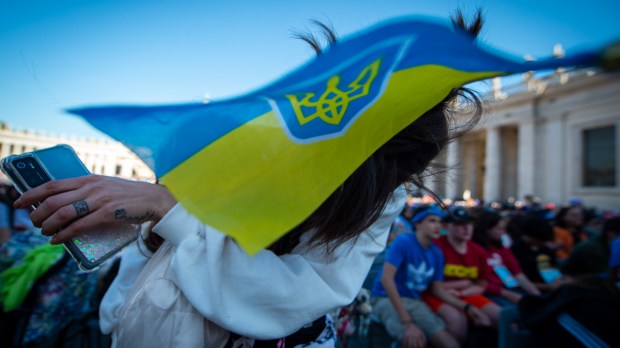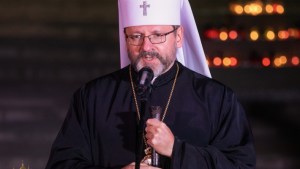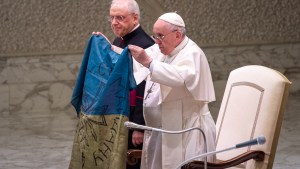On the subject of a trip to Kyiv, “the pope remains very convinced that if he could make a visit, it could also have positive results,” said Archbishop Paul Richard Gallagher, Secretary for Relations with States, in an interview with the Italian news channel TG1 on July 8, 2022. The British archbishop explained that such a trip will be studied after the pontiff returns from his trip to Canada at the end of July and that it is “possible” that it could happen in August.
“I would not rule it out, but it depends a lot on the results of the trip to Canada,” he said, explaining that it was necessary to see “how the pope will cope” with this “very demanding” transatlantic trip before deciding. A reference to the delicate health of the pontiff who, due to severe knee pain – including a “small fracture” – cancelled a trip in early July to the Democratic Republic of Congo and South Sudan.
The Vatican diplomacy chief also recalled that the pontiff “has always been willing to travel to Moscow and meet with the Russian authorities.” Indeed, in an interview with Reuters on July 2, Francis expressed his desire to visit both Kyiv and Moscow, saying he wanted to go to the Russian capital to “try to help somehow.” No pope in history has ever set foot in Russia.
Francis spoke in the same interview of a “very open” and “very cordial” dialogue between Russia and the Vatican. Moscow responded through the Foreign Ministry, saying there was no “substantial contact” between the two sides about a papal trip to Russia.
Archbishop Gallagher, in his interview with Italian television, said that contacts with Russia are “rather institutional” at the moment, mainly through the nuncio in Moscow and the Russian ambassador to the Holy See in Rome.
He estimated that a meeting between Patriarch Kirill and Pope Francis would take place if the two men were to travel to Kazakhstan for the great inter-religious meeting organized by the Kazakh government on September 14 and 15. “We must try to overcome difficulties and misunderstandings for the unity of the Church,” he insisted.
Concern for peace in the Balkans
In the interview, the Briton explained that the Holy See’s current concern is not only for Ukraine in Europe but also for the Western Balkans. Last March, the diplomat made an official trip to Bosnia-Herzegovina.
Pope Francis has spoken several times of the possibility of a trip. Notably, on the return flight from the apostolic visitation to Malta held in April, the pontiff said, “Yes, it’s on the table.”
One source told i.Media, “The Pope cannot visit one side of this conflict without visiting the other.” This means that according to Vatican diplomatic protocol, in order to travel to Kyiv, the pontiff would also have to travel to Russia.
Renewed concern for the Ukrainian people
In remarks following the Sunday Angelus on July 10, speaking from the balcony of the Apostolic Palace in St. Peter’s Square, Pope Francis renewed his concern for Ukraine. The Pope said, “I renew my closeness to the Ukrainian people, who are daily tormented by the brutal attacks that the ordinary people are paying for.” He assured Ukrainians of his prayers, saying, “I pray for all the families, especially for the victims, the wounded, those who are sick. I pray for the elderly and for the children.” He concluded his remarks by imploring Almighty God for and to the war, saying, “May God show the way to put an end to this senseless war.”



